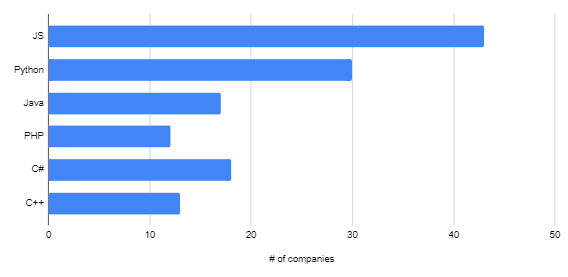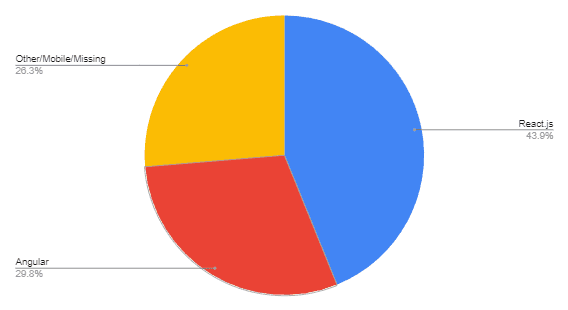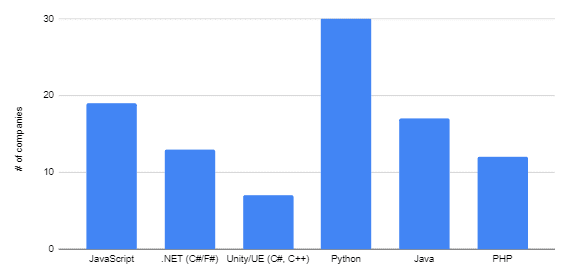How to Become a Software Developer in Nova Scotia?
Aug 22, 2023
Nova Scotia’s tech sector has seen tremendous growth in recent years. The Entervestor Atlantic Canada Startup Data 2021 report reported that the number of employees in Nova Scotia’s tech sector grew 32.1% in 2021! Those numbers are enough to turn heads and make people reevaluate their career choices. And that's probably why you're here, right?
To be clear, there are many technical paths you can go down in the tech industry that can be viewed as “becoming a software developer.” In this blog post, we will be talking about becoming a Full Stack Developer. A Full Stack Developer typically works on web apps or mobile apps and is capable of building both the front end and the backend of an application. This versatility makes them so valuable.
At Get Coding, we help people become software developers, and in the last 3 years of running our Software Development Coaching Program, we have learned that there are ultimately 4 steps (plus one bonus tip) that people need to follow in order to get retrained and become a software developer in Nova Scotia.
1.Learn the most in-demand skills
You are ready to learn, but everyone from all corners of the internet is shouting at you to learn Python, Java, JavaScript (“Wait, are they 2 different things?” - Yes, they very much are), Unity, C++, C# and a million other languages that they think are the right languages to learn first. So what should you actually learn?
We did the hard work and made our 2023 Tech Stack Report (you can see the whole thing here) to see what the most in-demand technologies are.
So, to begin, you need to pick a programming language to learn. In Nova Scotia, you can begin by learning either JavaScript or Python. We would recommend you start with JavaScript and add on HTML and CSS. This will allow you to build simple dynamic web applications.
Most common programming language
Across all stacks and regardless of the framework. For example, Node.js and TypeScript were counted under JavaScript.

Now you know JavaScript! Great! But you can’t actually find a job with that. So after you have mastered HTML, CSS, and JavaScript, you can start diving into learning a modern JavaScript framework. The most used one in Nova Scotia is React. React is so popular because it allows you to build big applications more quickly by reusing components, but it's got other great things going for it. It is used to build the front end of web applications (and its cousin React Native is used for building the front end of mobile applications).
Front-End Frameworks
React vs. Angular.
Companies without data or companies not using a specific framework (e.g. OpenGL, Unity) are categorized together under Other/Missing.

After you build the front-end of your project, it's time to add the back-end. The back-end allows you to connect and manage a database from the front-end and also do fancy calculations on a powerful server so the user's computer doesn’t catch fire. The most popular backend language in Nova Scotia is Python. And a great pairing for it is a relational database language, such as MySQL. Knowing these things will allow you to make pretty much any web app you can think of.
Back-End And Core
What do companies use for the back-end or the core of their application?
We have not separated the different JS/Python/Java/PHP frameworks for simplicity.

Now you have a pretty front end and a fancy backend - but it’s still just running on your own computer. So it’s time to deploy your application. The best place to do that is AWS (Amazon Web Services) because it’s the most popular cloud provider in Nova Scotia.
Cloud Provider
AWS, Azure and Google (GCP or Firebase)

2.Build COOL personal projects
Now that you know what languages to use, you need to put them to good use and build some cool, real-life projects.
Look at your hobbies, day-to-day life, or your work, are there any things that you wish could be automated or kept track of using a computer? Or have you ever dreamed of making a game or a tool to help you while you are woodworking? Well, it’s your time to shine and build something cool that helps you or the people around you.
And don’t you dare Google “projects to build with JavaScript”! Build something authentic, people can tell.
Our students have built a variety of amazing projects. Here are some for inspiration:
Using React, Scott built Towns Battle - a turn-based town defense game.
Using HTML, CSS, and JS, Jager built Math Mountain - a tool to generate math practice questions for kids.
Using React, and Node, Isabel built Knit & Pearl - a knitting manager to help design knitting patterns.
3.Network
You have built some personal projects but have no one to show them to. You gotta network!
There are 2 types of networking that you will need to do to maximize your chances of getting hired.
Online Networking
There are a few things you can get done from the comfort of your own home. Firstly, you need to be on LinkedIn. It’s a professional social media site and people there. To make sure you look the part, make sure your profile is looking great, here is a nice blog post about all the different things you can do to make yourself look professional. There you should connect with people from the local tech community, learn about all the cool tech companies around, be active, and post updates about the projects you are working on - but put in the effort!
Another thing you should do is join local dev groups, such as Halihax.
Subscribe to all local tech/startup newsletters, such as Volta, Digital Nova Scotia, and COVE - there, you will find out about networking events, news, and even jobs available within their networks.
In-person networking
I know this one is tough, not everyone is great at networking, but it works! I promise.
Because you have subscribed to all the newsletters in the province, you know about every single networking event that is happening across the province. Go to as many networking events as you can - it might suck, but you will meet so many great people it will be all worth it (just make sure you are working on
Just think about it this way - there are 500 applications for a junior role at a cool startup in Halifax - a lot of them have a great resume and an impressive portfolio. If you haven't met anyone in person, you will be just another resume in a pile. But when you start meeting people, you are no longer another resume in the pile, they can “add a face” to the application. On top of all this, it is widely believed that up to 70% of junior roles are not filled from job applications, but from the network of the team.
4. Build projects for people other than yourself
You now have a portfolio of things you built for, and some people had a look at it, but you still don’t have a job!
Well, to be real with you, junior software developer roles are really competitive these days. You are not the only one that noticed that working in tech is great. When you hear people talking about a “talent gap,” it’s typically referring to experienced software developers. So once you get there, life will be good, but now you will have to work on standing out even more.
A good way to do that is to build projects for other people. Got any entrepreneurial friends that keep talking about - well, now you have the skills to build it, build it for them! Or connect with some young local startups at … tell them about the skills you are bringing to the table and offer to volunteer or work cheaply for a brand new startup that’s working on an MVP (it means Minimum Viable Product - the first thing a startup builds and tests out with customers).
Bonus Tip: Use what you know to help you stand out
This tip makes perfect sense, but students don’t always think of this. Look at what you know, where you have studied, and what jobs you have had in the past. There might be a lot that you might be able to offer to a young startup that is building a solution to a niche problem in an industry you have experience in.
We have seen this over and over again - students coming from one industry, such as construction, automotive, or healthcare, end up getting a job at a tech company operating in the same field. If they bring amazing software development skills with knowledge of the industry, it’s a huge win for the tech company because they can speak the language of the software developers and also the customers!
To do this, you will have to know about the local tech startups - this is why you should build a strong network, stay connected with all the newsletters, and go to all the events. And be proud of what you know and have experience in.
Conclusion
To summarize, you need to:
Learn the most in-demand skills
Build cool personal projects
Network
Build projects for people other than yourself
Use what you know to help you stand out
We know this works because we have seen dozens of students go through the same thing, go from not knowing how to code and from an unrelated career to becoming a software developer, it’s not easy, but it’s absolutely possible.
And if you need help with your software development journey, you can always reach out to us. We are always happy to help, regardless of what stage of your journey you are at.
